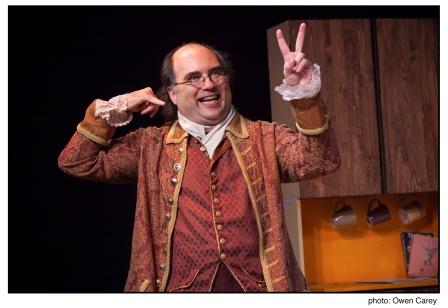
Josh Kornbluth bringing a dash of deceptive comedy to Founding Father Ben Franklin in his solo show in Portland Center Stage’s basement. Photo: Owen Carey
We have truly entered fall, and it’s not just the fireplace weather that tips me off. The sad truth is, suddenly Portland’s jumping with things to do, and Mr. and Mrs. Scatter just can’t jump high or fast enough.
We’ll miss the great Mikhail Baryshnikov and dancing partner, Ana Laguna, and we feel very bad about that. Our friend and cohort Martha Ullman West filed this terrific review of the White Bird show in this morning’s Oregonian.
Just last night we missed several one-time-only musical opportunities: the Portland Jazz Orchestra‘s Buddy Rich show; Indian slide guitarist Debashish Bhattacharya; the promising-looking Paris Guitar Duo; Portland Vocal Consort‘s evening of Handel and Haydn.
********************************
We did see monologuist Josh Kornbluth’s opening-night performance of Ben Franklin: Unplugged in the intimate basement space at Portland Center Stage, and given that you can’t see everything, it was a pretty good choice. Kornbluth and Ben will be playing the basement stage through Nov. 22, and I hope they get a good, packed run.
Kornbluth seems a little bit like a more extroverted, less dyspeptic Wally Shawn. He plays the nebbish role to the hilt, borrowing freely from Borscht Belt comic history and the vein of intellectual New York Jewish-radical neorosis that Woody Allen mines so freely. Starting with comic traditions that have served entertainers as diverse as Mort Sahl, Buddy Hackett and Neil Simon so well, he transforms them into a seemingly free-flowing riff that eventually doubles back on itself and makes structural sense.
To hear Kornbluth tell it, he became interested in old Ben when he looked into the mirror one day, inspected his receding hairline, and realized he’d come to look like the Founding Father. So why not do a show about him?
Like a lot of successful one-person shows, Ben Franklin: Unplugged takes its audience on a dual journey: one into the psyche and obsessions of the performer himself, the second into the performer’s discoveries about his external subject — in this case, Ben.
The link is fathers and sons: Kornbluth’s unresolved relationship with his own father, who died when Kornbluth was in college, and Franklin’s tortured relationship with his illegitimate but favored son William, who seemed the apple of his eye until the two took opposite sides on the issue of the Revolutionary War: the father the unrepentant radical, the son the extreme and sometimes ruthless loyalist.
Along the way Kornbluth creates a marvelous supporting character in the aged, accidental scholar Claude and unearths little pieces of fascinating biography in search of “my own Ben Franklin.” The wry blend of famous-man biography and obscure-entertainer autobiography makes for an engaging evening.
********************************
Other stuff to keep you eyes on:
La Boheme. Tonight is the final performance of Portland Opera‘s lively, fresh and winning production of the Puccini favorite, which Art Scatter wrote about here.
A Chorus Line. Musical-theater history at Stumptown Stages. How does this groundbreaking backstage show hold up after 34 years? Mr. Scatter will be there tonight to find out.
The Trip to Bountiful. Profile Theatre kicks off its season of plays by Horton Foote, who died last spring just shy of his 93rd birthday and who is perhaps best-known for his superb screen adaptation of To Kill a Mockingbird.
Becky’s New Car. Steven Dietz’s comedy opened last week at Artists Rep, but I haven’t caught it. I like Dietz, though: He’s been turning out good, well-shaped plays for regional theaters for many years.
A Country Doctor. Somehow Defunkt Theatre‘s season opener slipped past me. I don’t know this play — it’s an interpretation of the Kafka story — but it’s by Len Jenkin, another writer who’s always worth a shot.
Jon Kimura Parker and the Oregon Symphony. Pianist Parker performs Brahms’ First Piano Concerto and the orchestra plays Bartok’s Divertimento for string and Liszt’s Hungarian Rhapsody No. 1 in what could be a bell-ringer of a season-opening concert series Saturday, Sunday and Monday. Symphony violist Charles Noble, on his music blog Daily Observations, was enthusiastic about rehearsals.
Haochen Zhang. This year’s Van Cliburn winner plays Ravel, Beethoven, Brahms, Liszt and Mason Bates in a Portland Piano International performance at 4 p.m. Sunday in the Newmark.
San Antonio Vocal Arts Ensemble. Don’t know this touring group, but the program of Latin American sacred music sounds intriguing. 7:30 Saturday at University of Portland‘s Buckley Center, 4 p.m. Sunday at St. Paul’s Episcopal Church, Salem.
Aspen Santa Fe Ballet. The Southwest troupe performs pop-savvy Twyla Tharp’s Sue’s Leg at a White Bird performance Wednesday in the Schnitz.
 Portland Taiko. Rich Iwasaki/2009
Portland Taiko. Rich Iwasaki/2009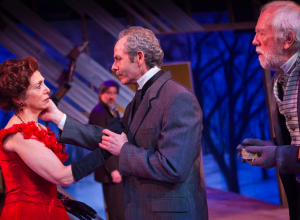 There isn’t much story to The Cherry Orchard, but there are themes, counter-themes, motifs. It’s chamber music, and the way we hear it can be startlingly different from production to production, depending not just on our own life experiences (interpreting Chekhov relies to an extreme on what the audience brings to it) but also on the emphases of interpretation on the stage: Do we concentrate on the cello tonight, or the bassoon? In truth, I suspect that even more so than ordinarily, every member of the audience sees a different play when watching Chekhov.
There isn’t much story to The Cherry Orchard, but there are themes, counter-themes, motifs. It’s chamber music, and the way we hear it can be startlingly different from production to production, depending not just on our own life experiences (interpreting Chekhov relies to an extreme on what the audience brings to it) but also on the emphases of interpretation on the stage: Do we concentrate on the cello tonight, or the bassoon? In truth, I suspect that even more so than ordinarily, every member of the audience sees a different play when watching Chekhov.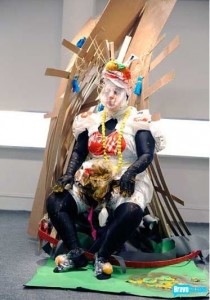 Shows like Idol and
Shows like Idol and 
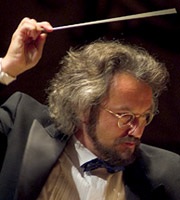 The symphony’s kicking into its season. So are the opera and the city’s theater companies. Ballet is getting ready to haul out the slippers. Across the city, tuxedos are coming out of mothballs (OK, that’s an exaggeration: This IS Portland) and uptown revelers are dusting off their dancing shoes.
The symphony’s kicking into its season. So are the opera and the city’s theater companies. Ballet is getting ready to haul out the slippers. Across the city, tuxedos are coming out of mothballs (OK, that’s an exaggeration: This IS Portland) and uptown revelers are dusting off their dancing shoes.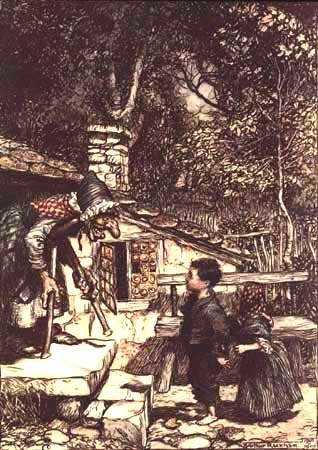 The smashing success of last Friday’s
The smashing success of last Friday’s 